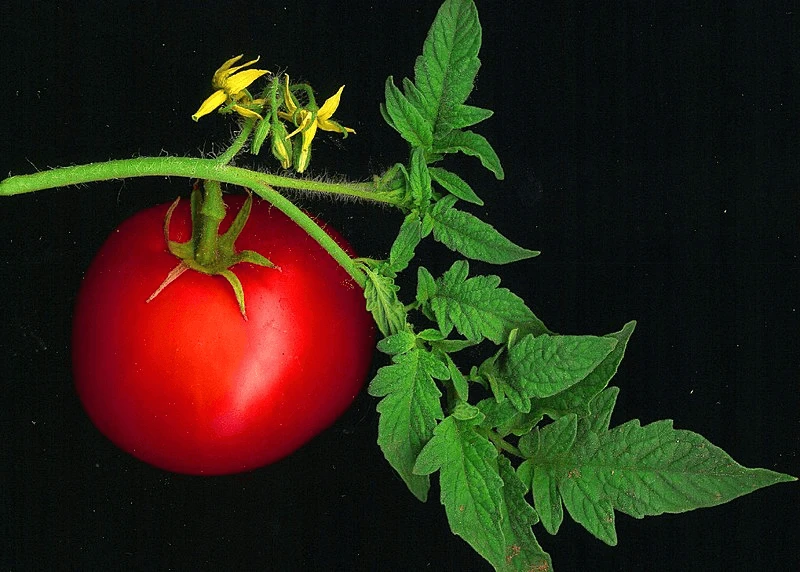Latest CRISPR food innovation: South Korea develops tomato with enhanced levels of provitamin D3. Will it go to market?
Latest CRISPR food innovation: South Korea develops tomato with enhanced levels of provitamin D3. Will it go to market?


In a new report published in GEN Biotechnology (the sister journal to GEN), researchers from Seoul National University (SNU) in South Korea have applied CRISPR gene editing to produce tomato fruits with enhanced levels of provitamin D3 (ProVitD3).
In humans, ProVitD3 is a precursor for the synthesis of biologically active vitamin D3 and serves as a protective agent against ultraviolet radiation on the skin. Circulatory vitamin D often falls below desirable levels, particularly among individuals with limited exposure to sunlight. While dietary supplements help address this deficiency, natural vitamin D sources are restricted to a few animal-derived sources, such as fish, egg yolks, and beef liver, as fruits and vegetables have historically shown limited capacity for ProVitD3 production.
The burning question remains: What are the regulatory and scale-up hurdles that impact whether these tomatoes head to the market? [Researcher Sunghwa] Choe states that in many countries, there is a growing consideration that CRISPR genome-edited crops may be exempt from conventional GMO regulations.
…
Choe says that lawmakers in Korea are actively engaged in discussions regarding this issue, indicating a willingness to explore and potentially relax regulations surrounding CRISPR-edited crops in the coming years.
This is an excerpt. Read the original post here

 | Videos | More... |

Video: Nuclear energy will destroy us? Global warming is an existential threat? Chemicals are massacring bees? Donate to the Green Industrial Complex!
 | Bees & Pollinators | More... |

GLP podcast: Science journalism is a mess. Here’s how to fix it

Mosquito massacre: Can we safely tackle malaria with a CRISPR gene drive?

Are we facing an ‘Insect Apocalypse’ caused by ‘intensive, industrial’ farming and agricultural chemicals? The media say yes; Science says ‘no’
 | Infographics | More... |

Infographic: Global regulatory and health research agencies on whether glyphosate causes cancer
 | GMO FAQs | More... |

Why is there controversy over GMO foods but not GMO drugs?

How are GMOs labeled around the world?

How does genetic engineering differ from conventional breeding?
 | GLP Profiles | More... |

Alex Jones: Right-wing conspiracy theorist stokes fear of GMOs, pesticides to sell ‘health supplements’




 Viewpoint — Fact checking MAHA mythmakers: How wellness influencers and RFK, Jr. undermine American science and health
Viewpoint — Fact checking MAHA mythmakers: How wellness influencers and RFK, Jr. undermine American science and health Viewpoint: Video — Big Solar is gobbling up productive agricultural land and hurting farmers yet providing little energy or sustainabilty gains
Viewpoint: Video — Big Solar is gobbling up productive agricultural land and hurting farmers yet providing little energy or sustainabilty gains Fighting deforestation with CO2: Biotechnology breakthrough creates sustainable palm oil alternative for cosmetics
Fighting deforestation with CO2: Biotechnology breakthrough creates sustainable palm oil alternative for cosmetics Trust issues: What happens when therapists use ChatGPT?
Trust issues: What happens when therapists use ChatGPT? California, Washington, Oregon forge immunization alliance to safeguard vaccine access against federal undermining
California, Washington, Oregon forge immunization alliance to safeguard vaccine access against federal undermining 30-year-old tomato line shows genetic resistance to devastating virus
30-year-old tomato line shows genetic resistance to devastating virus The free-range chicken dilemma: Better for birds, but with substantial costs
The free-range chicken dilemma: Better for birds, but with substantial costs ‘You have to treat the brain first’: Rethinking chronic pain with Sanjay Gupta
‘You have to treat the brain first’: Rethinking chronic pain with Sanjay Gupta
